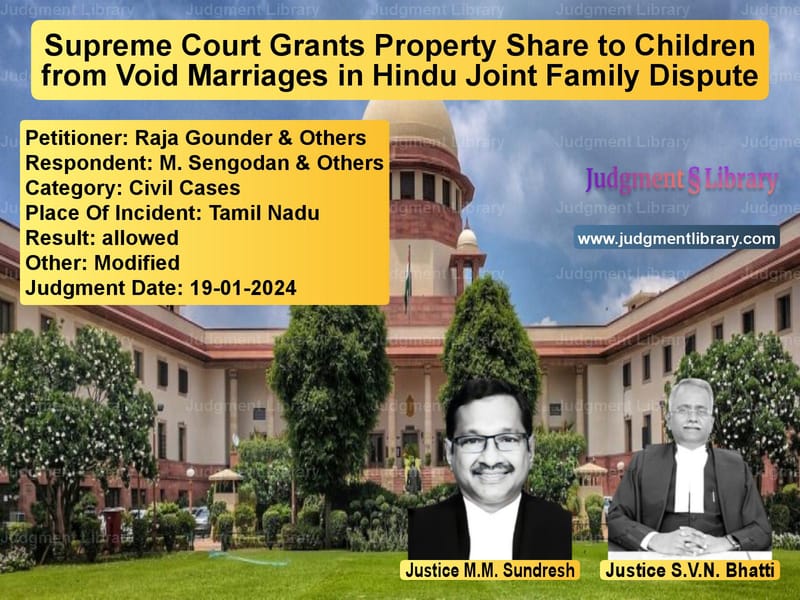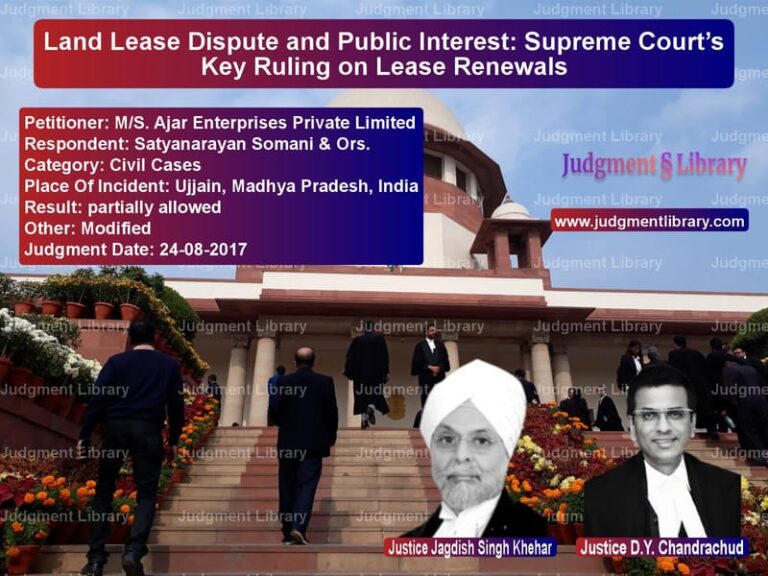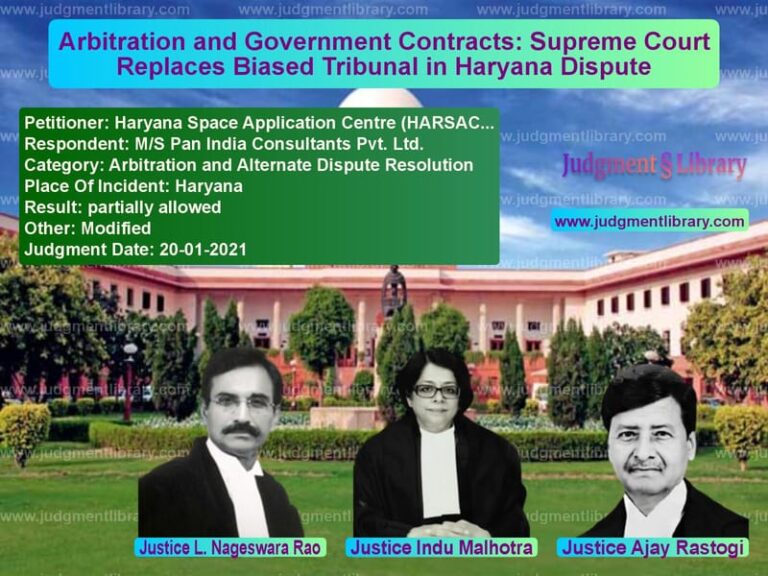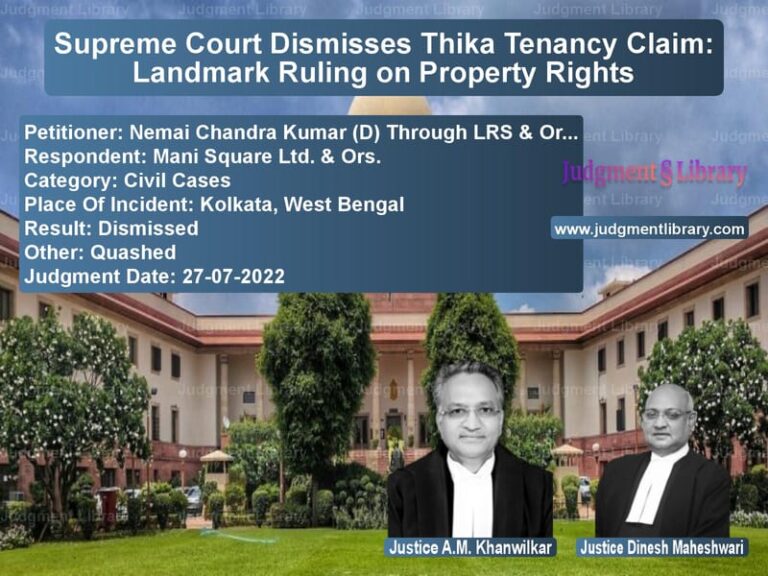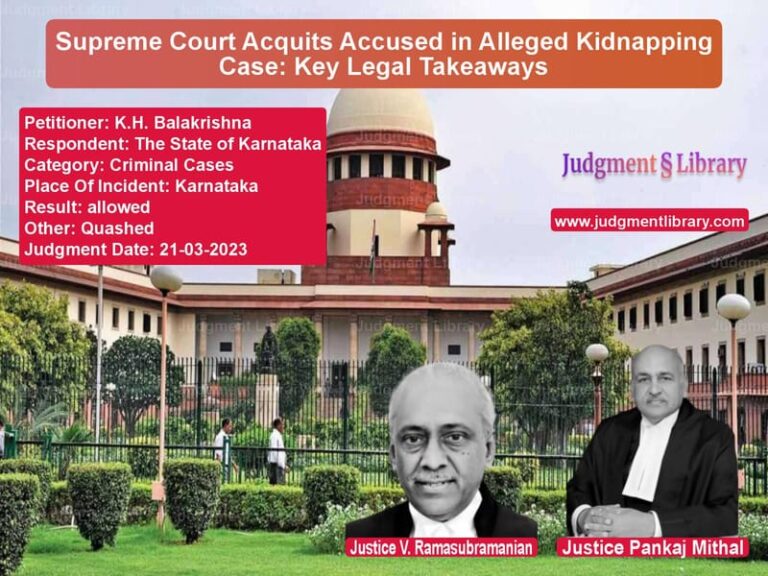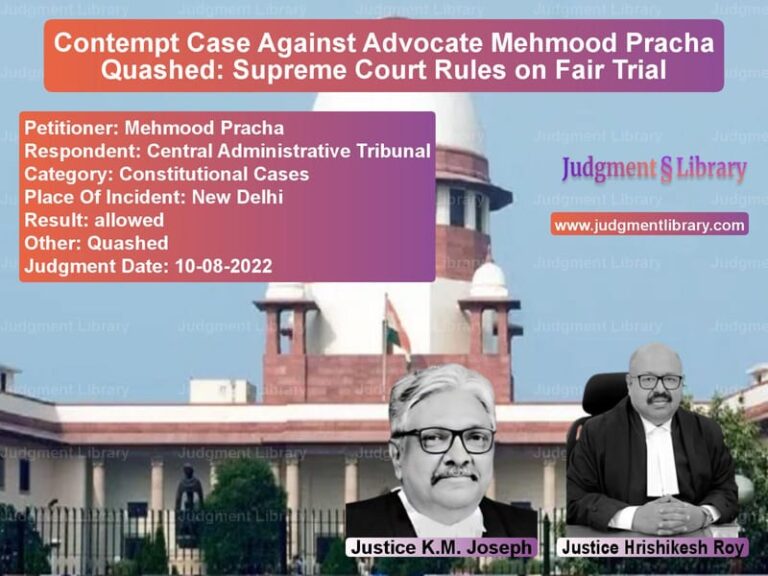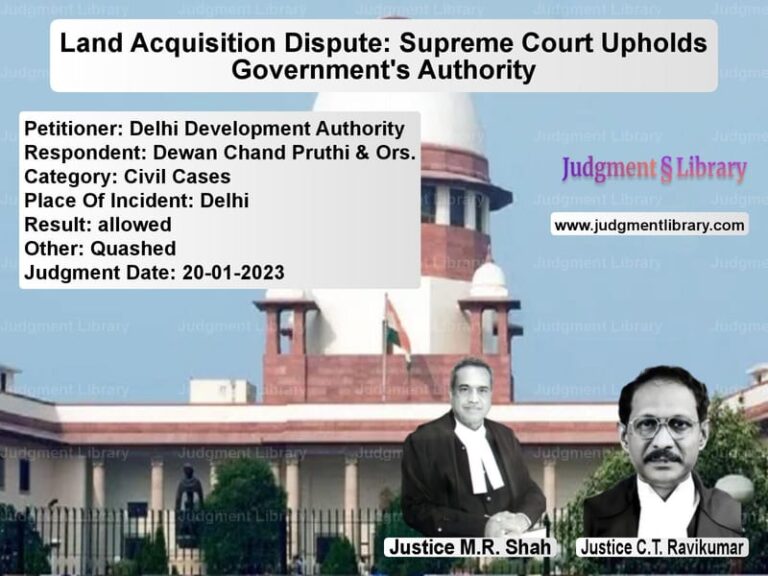Supreme Court Grants Property Share to Children from Void Marriages in Hindu Joint Family Dispute
The Supreme Court of India has ruled in favor of children born from void or voidable marriages, recognizing their right to inherit their father’s ancestral property. The case involved a long-standing family dispute over property division, in which the appellants—descendants from a second marriage—were initially denied a share in the family estate. The ruling clarifies the interpretation of Hindu inheritance laws and the rights of children born from marriages deemed legally invalid.
Background of the Case
The case revolved around a partition dispute concerning ancestral properties in Tamil Nadu. The plaintiffs, M. Sengodan and another, filed a suit for partition and separate possession of three agricultural properties. They claimed inheritance rights as coparceners of a Hindu Undivided Family (HUF) headed by their deceased father, Muthusamy Gounder.
The appellants, Raja Gounder and others, were impleaded as defendants and claimed that they too were legal heirs, being children from Muthusamy Gounder’s second marriage. The primary contention in the case was whether children from this second marriage had a right to inherit ancestral property.
Trial Court and High Court Verdicts
The trial court ruled that only the first wife and her children were entitled to a share in the property, dismissing the claims of the appellants. The High Court upheld this ruling, holding that the marriage between the appellants’ mother and Muthusamy Gounder was not legally valid. Consequently, the children from that union were deemed ineligible to inherit property.
Petitioners’ Arguments
The appellants argued that:
- The trial and High Court judgments failed to consider their rights under the Hindu Marriage Act and the Hindu Succession Act.
- The children of void or voidable marriages are deemed legitimate under Section 16 of the Hindu Marriage Act, 1955.
- As legal heirs, they were entitled to inherit their father’s ancestral property.
- Documents, such as a mortgage deed and electoral rolls, demonstrated that their father acknowledged them as his children.
Respondents’ Arguments
The respondents countered that:
- Only legitimate children from a legally valid marriage could inherit property.
- The lower courts correctly interpreted Hindu law in denying inheritance to children from an invalid marriage.
- The appellants had failed to prove their legal status as heirs.
Supreme Court’s Ruling
The Supreme Court, in its ruling, set aside the High Court’s decision and recognized the inheritance rights of the appellants. The Court held:
- Children born from void or voidable marriages are considered legitimate under Section 16 of the Hindu Marriage Act.
- They are entitled to inherit their father’s share in ancestral property, though they cannot claim coparcenary rights.
- Key documents, including a registered mortgage deed, showed that the father acknowledged the appellants as his children.
- Inheritance rights should not be denied solely based on the legitimacy of a marriage.
The Court referred to its earlier judgment in Revanasiddappa v. Mallikarjun (2023), which upheld the inheritance rights of children born outside of a legally valid marriage.
Key Directives of the Supreme Court
In allowing the appeal, the Supreme Court issued the following directives:
- The property shall be divided equally among all children of Muthusamy Gounder, including those from the void marriage.
- A preliminary decree for partition is passed, granting the appellants a rightful share.
- Lower courts must ensure that future inheritance disputes consider the evolving interpretation of Hindu succession laws.
Significance of the Judgment
The ruling has far-reaching implications for Hindu inheritance law:
- It reinforces the legitimacy of children born from void marriages under Section 16 of the Hindu Marriage Act.
- It clarifies that such children have inheritance rights in their father’s separate property.
- It distinguishes between coparcenary rights and inheritance rights, ensuring fair distribution of property.
- It prevents discrimination against children based on their parents’ marital status.
Conclusion
The Supreme Court’s decision in Raja Gounder & Others v. M. Sengodan & Others is a landmark ruling that strengthens the legal position of children from void marriages. By ensuring their inheritance rights, the judgment promotes equality and fairness in Hindu family law. The ruling serves as a guiding precedent for future disputes concerning ancestral property and the rights of heirs from non-traditional family structures.
Petitioner Name: Raja Gounder & Others.Respondent Name: M. Sengodan & Others.Judgment By: Justice M.M. Sundresh, Justice S.V.N. Bhatti.Place Of Incident: Tamil Nadu.Judgment Date: 19-01-2024.
Don’t miss out on the full details! Download the complete judgment in PDF format below and gain valuable insights instantly!
Download Judgment: raja-gounder-&-other-vs-m.-sengodan-&-others-supreme-court-of-india-judgment-dated-19-01-2024.pdf
Directly Download Judgment: Directly download this Judgment
See all petitions in Property Disputes
See all petitions in Succession and Wills
See all petitions in Landlord-Tenant Disputes
See all petitions in Judgment by M.M. Sundresh
See all petitions in Judgment by S.V.N. Bhatti
See all petitions in allowed
See all petitions in Modified
See all petitions in supreme court of India judgments January 2024
See all petitions in 2024 judgments
See all posts in Civil Cases Category
See all allowed petitions in Civil Cases Category
See all Dismissed petitions in Civil Cases Category
See all partially allowed petitions in Civil Cases Category

